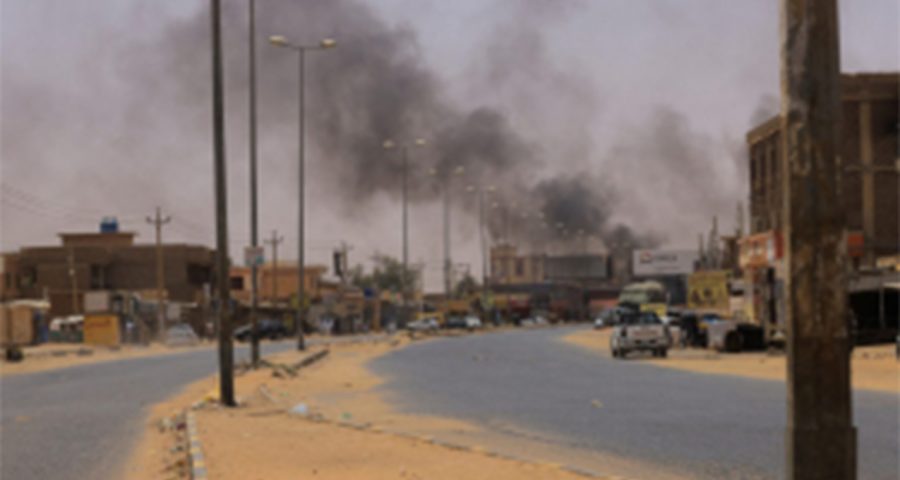
Sudan’s capital ceasefire: fighting in Sudan finally calms
Sporadic artillery fire still echoed in Sudan’s capital Tuesday may 23rd but residents said fighting had calmed. Sporadic artillery fire still echoed in Sudan’s capital Tuesday may 23rd but residents said fighting had calmed following a US and Saudi-brokered ceasefire, raising faint hopes in the embattled city. In the sixth week of the war, witnesses […]

Sporadic artillery fire still echoed in Sudan’s capital Tuesday may 23rd but residents said fighting had calmed.
Sporadic artillery fire still echoed in Sudan’s capital Tuesday may 23rd but residents said fighting had calmed following a US and Saudi-brokered ceasefire, raising faint hopes in the embattled city.
In the sixth week of the war, witnesses reported a relative calm had taken hold, both in greater Sudan’s capital, Khartoum and in the Darfur region’s cities of Nyala and El Geneina, which have been among the other main battlegrounds. “We have not heard shelling in our neighbourhood since last night,” said a witness in southern Khartoum.
ALSO READ: Sudan’s ceasefire: air strikes, combat as one-week truce starts
Residents had reported combat and air strikes in different districts of the capital minutes after the ceasefire formally started at 9:45 pm (1945 GMT) on Monday. The battles since April 15 have killed an estimated 1,000 people, sparked mass evacuations of foreigners and forced more than a million people to flee their homes internally and across borders, fuelling concerns for regional stability.
READ MORE: Malema warns of anarchy and looting in BBC interview
SUDAN’S CAPITAL EXPLOSIONS AND DEATHS
The week-long truce aims to allow desperately needed humanitarian aid for civilians, and restoration of essential services. US State Department spokesman Matthew Miller told reporters in Washington that a monitoring committee, set up under the truce agreement, is “looking into those reports” of ceasefire violations. Secretary of State Antony Blinken said earlier in a video message that violators will be held accountable.
ALSO READ: Sudan conflicts rages: explosions in Khartoum as ceasefire nears
SUDAN’S CAPITAL: ALONE AND ABANDONED
The fighting pits the army, led by Sudan’s de facto leader Abdel Fattah al-Burhan, against the paramilitary Rapid Support Forces of his former deputy Mohamed Hamdan Daglo. Those unable to flee have run low on water, food and basic supplies, and more than half the population, 25 million people, need humanitarian aid, according to the UN.
“Seven days is not a long time if you look at the massive scale of humanitarian emergency in Sudan,” Patrick Youssef, International Committee of the Red Cross regional director for Africa, told AFP on Tuesday. “But we are also in a situation where every minute counts and can provide a much-needed respite,” he said. The text of the truce deal says warring parties agreed to secure “unimpeded road access along designated corridors or routes for humanitarian assistance delivery”.
ALSO READ: Russia declares partial ceasefire allowing civilians to leave Mariupol
AID WORKERS ARE WAITING IMPATIENTLY
No permits had been authorised as of Tuesday, one international humanitarian worker told AFP on condition of anonymity, due to safety concerns. “The whole country is taken hostage,” and both parties have “singularly failed” to respect international humanitarian law, said the UN’s expert on human rights in Sudan, Radhouane Nouicer. Nevertheless, Sudan’s capital has experienced conflicts for the first time in history.
“People feel alone and abandoned amid a chronic shortage of food, drinking water, homes destroyed, indiscriminate attacks in residential areas and widespread looting.” The pause in fighting longed for by Sudans’s capital residents would also enable more of them to flee the city. The United Nations said nearly 650,000 had already done so during the war, in which numerous ceasefires previously announced were quickly violated.
Before it began, there had been an absence of signals on the ground that the latest truce would be honoured. Volker Perthes, the UN envoy to Sudan, told the Security Council on Monday that “fighting and troop movements have continued even today, despite a commitment by both sides not to pursue military advantage before the ceasefire takes effect”. The US and Saudi Arabia said this agreement was different because the seven-page document was “signed by the parties” and would be supported by the monitoring mechanism, a committee with three members each from the US, Saudi, the army and RSF.
ALSO READ: Taliban offer three-month ceasefire in return for prisoner release
HOSPITALS VIOLATION
Neither side has directly blamed the other for breaking this truce — as they did within minutes after previous ceasefires collapsed. But the health ministry released a statement on Tuesday accusing the RSF of violating hospitals. The ministry, loyal to Burhan, said RSF troops “stationed themselves” inside two hospitals in greater Khartoum, the Sudan’s capital on Tuesday 23rd of May, “assaulting medical staff and ejecting patients”.
THE RSF CALLED THE ACCUSATIONS “LIES”.
Major fighting has devastated the Darfur region near Chad, where the UN has reported hundreds of civilians killed in the West Darfur capital El Geneina. Perthes in his Security Council address warned that “the conflict risks to expand and prolong… with implications for the region.”
ALSO READ: Sudan war locks depositors out of savings, system at standstill
In some areas fighting “has sharpened into communal tensions, or triggered conflict between communities”, he said, after reports of civilians being armed in Darfur. Sudan has a long history of military coups. The army 2019 overthrew the veteran Islamist autocrat Omar al-Bashir after mass protests against his rule. Sudanese were promised a gradual transition toward civilian rule, but Burhan and Daglo staged another coup in October 2021 before simmering tensions between the two men flared into the current war.
